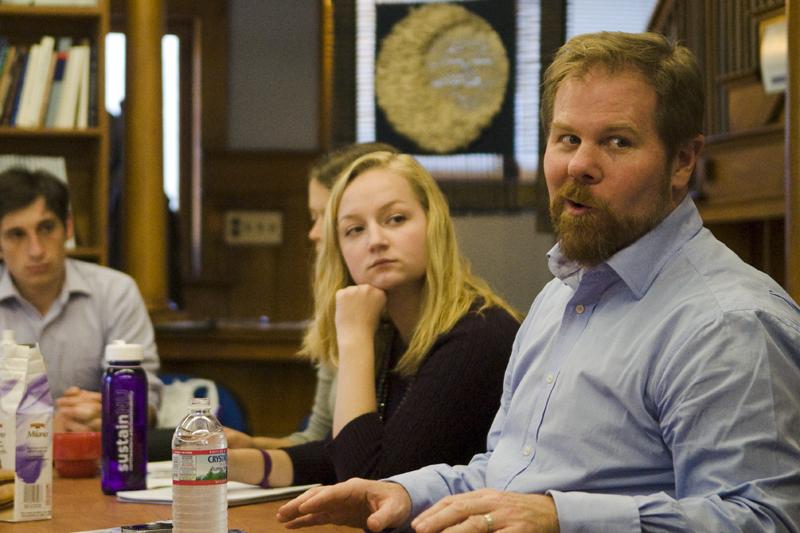Australian author David Kilcullen, the former counterinsurgency adviser to ex-CIA director David Petraeus, offered his take Monday on the future of military conflict.
Kilcullen, who has also worked for former Secretary of State Condoleezza Rice, is an expert in the area of conflict insurgency. He spoke with the Northwestern Political Union at the Buffett Center on his new book, “Out of the Mountains: The Coming of Age of the Urban Guerilla,” and the subject of conflict and urban environments. The talk was held at a large table, which allowed all 18 attendees to easily communicate with him.
“I really liked the format — the way it was discussion based,” Weinberg freshman Bob Sherman said.
During the discussion, Kilcullen said there are four big trends that will affect how conflicts play out in the future. These included three old trends — urbanization, coastalization and population growth — as well as one new trend: connectivity.
“Connectivity changes the way conflicts play out,” Kilcullen said. “It takes much less time for conflicts to spread because everyone is talking.”
He cited the Arab Spring and the Syrian civil war as examples of the effect connectivity can have on massive conflicts.
Kilcullen also discussed challenges in managing conflicts in urban environments.
“If you look at it closely, there is no military solution there,” he said.
He said handling urban conflict requires an effort from local natives in combination with technological knowledge, as well as help from outside forces.
“It’s not enough to just ask the locals,” Kilcullen said. “They might not know (how to handle the situation). If locals can’t get it together, we shouldn’t go in.”
The majority of the event focused on the topics of cyber warfare and the use of drones.
“Technology is not politically neutral,” Kilcullen said. “We’re going to have to look back and think, ‘Have we set a norm that could be better?’”
Kilcullen finished the discussion saying that future conflicts will most likely be focused around developing countries.
“Massive amounts of potential conflicts that lie in Africa, Latin America and South Asia all have a high possibility of being high conflict areas,” said Kilcullen. “These conflicts won’t always be over ideology but also resources.”
The discussion ended abruptly, leaving many guests with lingering thoughts. Kilcullen said he wanted to leave everyone with a question he did not cover in his book but believes is important to discuss: “Why do we continually engage in irregular conflict?”
Despite the quick ending, Political Union co-president Ben Koltun was content with the discussion.
“It was amazing,” he said. “It was a very personal, informal setting.”
Bienen freshman Nick Griffiths said the talk raised aspects of conflict he hadn’t before considered.
“He talked about a lot of ideas that I hadn’t thought about,” Griffiths said.
Email: [email protected]
Twitter: @luianchez







